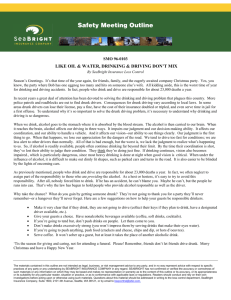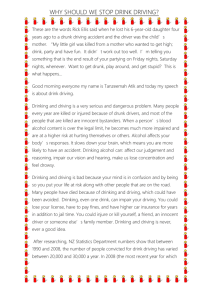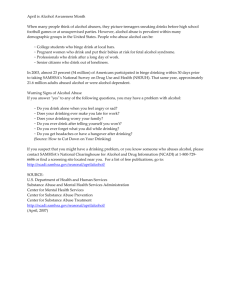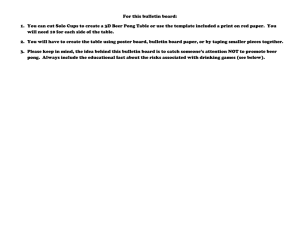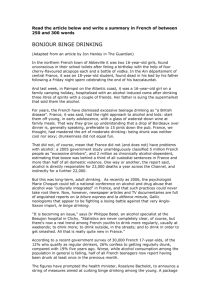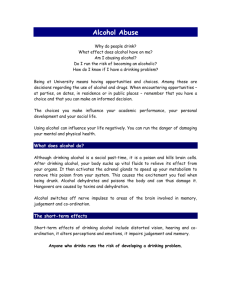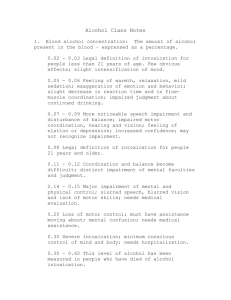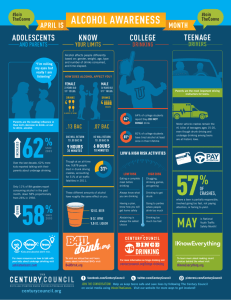Substance Abuse Education
advertisement
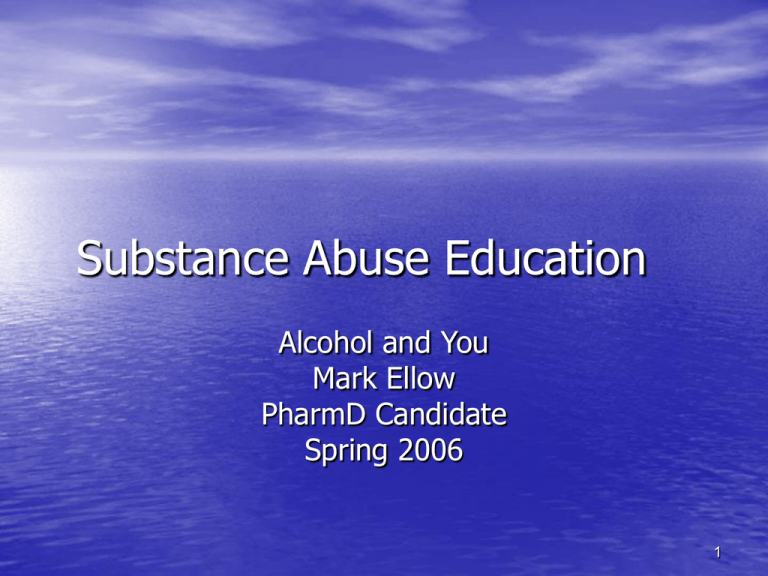
Substance Abuse Education Alcohol and You Mark Ellow PharmD Candidate Spring 2006 1 Purpose of this presentation… • To remind you that • next time you are at a party and you see this, think twice and know you’re limits. Who knows, maybe you won’t drink at all? www.cap.org.uk/.../ 0/bottles_300_afoncn.jpg 2 Alcohol in General • Alcohol in general is something that has been either consumed or abused for decades. Particularly, college students have the highest action in abusing alcohol and pushing consumption to and beyond the limits (1). Abuse at this age in life will eventually lead to long term side effects of all sorts but most importantly it could have a severe effect from just one night of partying… 3 Affects of alcohol (Moderate Usage) .01-.25 Blood alcohol level Avg. Male: 1-5 drinks Avg. Female: 1-4 drinks • Impaired judgment, blurred vision, and slurred • • speech. Normal walking balance is off Your reaction time plummets – You could really use your reaction time for sports and safety of yourself and others in a car. • These effects make it easier for you to injure • yourself physically Talkitiveness, higher self confidence. 4 Severe affects of alcohol (Large Consumption) .25 - .40 blood alcohol level Avg. Male: 5+ drinks Avg. Female: 4+ drinks • Major drop in blood pressure and body sugar • • • • • levels. Increase in pulse, respiratory rate, and body temperature. Vomiting Incontinence (lose control of bodily fluids) Senses are way off and no response to stimuli. Violent behavior could lead to jail time, unconsciousness, and death. 5 Severe effects of alcohol (Binge Drinking) • Binge drinking seems to be the trend for most • • • college kids. (44% of USP students Binge) It can be defined as completely overloading your system with alcohol. Your body can only take in so much alcohol at a time, and by doing this, all of the consequences on the previous slide can take place. Hospital attention is needed along with the saying “I’m never drinking again!” 6 Severe effects of alcohol (Hangover Symptoms) • Hangover is a feeling felt the day after drinking (usually being really drunk the night before.) – – – – Your head hurts You are dehydrated You are sluggish Getting up early isn’t even a possibility. http://www.jemstarentertainment.c om/Hangover.jpg 7 Severe effects of alcohol (Hangover explanation) • Alcohol is a toxin to the liver and in order for it to be eliminated, the liver needs a lot of water to dilute it. If high amounts of water are not available, your body will draw it from where ever it can, resulting in dehydration. • Neurologically, the withdrawal of alcohol from your brain causes headaches and discomfort. 8 Severe effects of alcohol (Hangover remedies – Myths) • Drinking coffee is believed to be the method of “waking up from a hangover”. Think again! The caffeine will further dehydrate you and plus irritate your stomach. • Drinking more will just delay the hangover, YOU WILL EVENTUALLY GET IT! • Hangover supplements like BrainQuicken© and Chaser© just do the same as eating healthy foods the day after. Fruits and veggies put back the nutrients you lost from drinking and other vitamins can assist in the transportation of oxygen through the body as well as brain. • The only real cure for a hangover is TIME. Give your body time to heal itself. (2) 9 Chronic abuse of alcohol • Gastric ulcers of the • • • • • • stomach Inflammation of the pancreas. Liver and kidney failure Heart disease (higher chance of getting it with heart disease running in the family) Chronic depression Suicide Overweight http://www.abc.net.au/science/ news/img/people/beerbelly.jpg 10 Alcohol Pharmacology • Ethanol (alcohol) is a colorless, odorless • hydrocarbon. It is a liquid that is consumed or administered orally. It is fully miscible in water and is both water and lipid soluble (can pass into your cells very easily). There is still a debate over the mechanism of action for alcohol, but researchers say it interacts with a variety of neurotransmitters in the brain. Basically the brain is not doing its job properly with these inhibitors. (3) 11 Body Chemistry • The dosage of alcohol in you depends on a few things. – How much you weigh – How tolerant you are, – Whether you are male or female. http://www.calvin.edu/acade mic/chemistry/images/mainL.j pg 12 Body Chemistry Cont. • Alcohol is metabolized differently by men and • • • women. This is due to the enzyme alcohol dehydrogenase (ADH). ADH is what facilitates the metabolism of alcohol and is more abundant in men that women. When you hear that someone has a high tolerance of alcohol, that means they have a high quantity of the enzyme in their system.(4) 13 What is a standard drink? • A standard drink usually contains about 14 grams of alcohol (0.6 fluid ounces). – – – – 12oz of beer = 1 drink 12oz of malt liquor = 1.5 drinks 5oz of table wine (1/5 bottle) 1 drink 1.5oz of 80 proof liquors = 1 drink • ie Wiskey, Vodka, Brandi, • Alcohol dosage is more potent due to the higher percentage of alcohol in the drink. Beer the lowest and liquor being the highest. (5) 14 Why do people drink? • People drink just because • • • • they like it. Just to get drunk is a reason. For younger adolescents, drinking is viewed as a “cool” thing. People drink just to fit it. Alcohol makes people feel like they have escaped their problems. http://images1.comstock.com/Imagew arehouse/IT/SITECS/NLWMCompingVer sions/CD034/ITF034076.jpg 15 Psycho/Social Effects • College kids feel that it allows them to escape the • • • pressure and responsibility of reality, it makes them feel like a “kid” again. Kids just want a break from things, college life can seem overwhelming at times. They think of it as “a mental vacation” to be drunk. For some going to college involves social contact with “strangers”. Social anxiety is relieved by using alcohol. ie. they loosen up. Socially everyone is different. Students have their problems and use alcohol to “self-medicate” themselves for anxiety, depression and other stressers. 16 Psychological Effects • Students feel they can not function without it. (This shows the addictive nature of alcohol). • Coping with problems seems harder when being sober. • Psychologically one is addicted to the feelings of being drunk. From here you might get more of a craving for alcohol. 17 Psychological Effects Cont. • We are still maturing in our cognitive, emotional, and • • • behavioral ways but the use of alcohol interferes with this process by delaying our actual feelings. Behaviorally, we make risky decisions like driving drunk after doing 21 shots on our 21st birthday. Reasoning, thinking, and judging skills are affected. Emotionally we need our relationships with friends, boyfriends, girlfriends, or whomever. Alcohol can ruin those relationships leaving us feeling empty. Not good for emotional development. 18 Summary • Alcohol truly effects every system in our bodies, but it so happens to be that alcohol targets three very important ones. The Central Nervous System, Respiratory system, and the Cardiac system. In the long run, alcohol can be extremely deadly to the body. A thought to remember is limit your alcohol intake next time at a party for you could be in a life threatening situation. Are you really willing to risk your future from a night of drinking?? 19 References • (1) "Kids and Alcohol.“ [About 3 screens] Kids Health [homepage on the Internet] . c2006. The Nemours Foundation. 2 Mar. 2006 [Date accessed] <http://kidshealth.org/parent/emotions/behavior/alcohol.html>. • (2) "So You Wanna Cure a Hangover.“ [About 2 screens] So You Wanna.com. [Homepage on the Internet] c2006. 27 Feb. 2006 [Date accessed] <http://www.soyouwanna.com/site/syws/hangover/hangover.html> • (3) Goldfrank’s Toxicologic Emergencies. 7th ed. c2002. The McGrawHill Companies, Inc. “Chapter 64 Ethanol” Jan. 25th 2006 [Date accessed]. Avaliable from STAT!Ref [database on the Internet]. 20 References Cont. • (4) Goldfrank’s Toxicologic Emergencies. 7th ed. c2002. The McGraw-Hill Companies, Inc. “Chapter 64 Ethanol” Jan. 25th 2006 [Date accessed]. Avaliable from STAT!Ref [database on the Internet]. • (5) "What is a Standard Drink?“ [About 1 screen] Road Safety Council. [Homepage on the Internet] c2006. 27 Feb. 2006 [Date accessed] <http://www.officeofroadsafety.wa.gov.au/Facts/dd_broc hure/what_is_standard.htm>. 21
